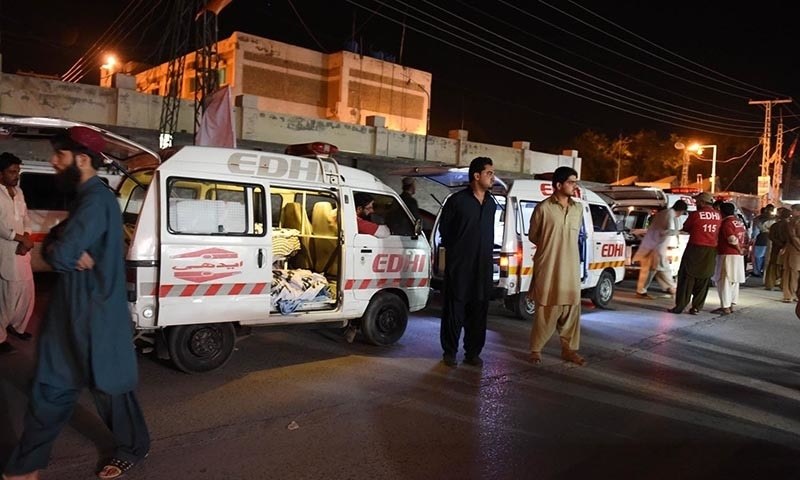At least 52 people were killed and more than 50 injured in an explosion in a procession on the occasion of the 12th of Rabi’ul Awwal in Mastung district of Baluchistan province on September 29th 2023. Local authorities have confirmed the death toll of 52, while the Baluchistan government has declared three days of mourning in the province. According to SHO (Local Police Officer) Mustang City Javed Lahri, the explosion occurred near a mosque on Al Falah Road.
Baluchistan Caretaker Information Minister Jan Achakzai told the media that the death toll in the Mustang blast is unfortunately increasing. He said that the investigation is ongoing and it will be known whether it was an IED blast or a suicide attack. Caretaker Provincial Interior Minister Zubair Jamali told the media that the death toll is increasing and several people are in a critical condition. Officials say that a DSP was also killed in the blast.
On the other hand, 5 people have been killed and 12 injured in a suicide blast in a mosque in Hangu district of Khyber Pakhtunkhwa. According to the police, around 30 to 40 worshipers were present in the mosque. According to ISPR, on 28 September, Pakistan security forces thwarted an attempt of TTP terrorists to infiltrate from Afghanistan into Pakistan near Sambaza in Dist Zhob close to Pak-Afghan border.
In the ensuing operation, Havildar Sattar, Lance Naik Sher Azam, Lance Naik Adnan and Sepoy Nadeem fought valiantly and sacrificed their lives. During fire exchange, 3 terrorists were killed and few got injured.
The Pakistan Institute for Peace Studies (PIPS), a research group in Islamabad, claims that the number of terrorist strikes increased by 27% between 2021 and 2022. The Tehreek-e-Taliban Pakistan (TTP), which has intensified its activities has carried out many of these attacks, if not all of them.
According to experts, the most recent wave of militancy grew when the Afghan Taliban retook Kabul in August 2021, and the TTP has increased attacks on Pakistani security forces since late last year.
Although distinct from the Afghan Taliban, the TTP is frequently referred to as the Pakistani Taliban and holds a similar strict Islamist ideology.
Since its founding in 2007, the organisation has waged war against the Pakistani government, carrying out some of the bloodiest attacks in the nation’s history, such as the one that killed 150 people, including 132 children, in 2014 at the Army Public School in Peshawar.
Major offensives launched by the Pakistani military in 2014 and 2017 mostly succeeded in crushing the militant organizations, ushering in a time of relative respite and peace in the nation.
However, observers claim that since the Taliban retook control of the neighboring Afghan government, the TTP has shown a renewed commitment to overthrowing Pakistan’s “un-Islamic” government.
“Nearly two years later, the Taliban have not only not helped Pakistan address its TTP problem, they’ve also openly called for better [Afghan] relations with India,” adding that a stronger bilateral relationship with Pakistan’s adversary would signify less support for Islamabad.
Splinter organizations have rejoined the parent group as a result of leadership shift inside the TTP, building a stronger, more unified organization. Before US troops left Afghanistan in 2020, numerous TTP groups began to unite. The Taliban’s re-takeover of power in Afghanistan only fueled their momentum.
Major blow to the relations of Pakistan and Taliban regime in Kabul took place when on September 10 when Tehreek-e-Taliban Pakistan (TTP), had taken responsibility for the skirmishes that claimed at least 12 armed fighters and four Pakistani soldiers’ lives.
The Pakistani army said in a statement that two military checkpoints in the Chitral district of the northwest province of Khyber Pakhtunkhwa were attacked by a sizable group of “terrorists equipped with the latest weapons,” leading to a “intense exchange of fire.”
According to the statement, the strikes were organized from the neighbouring Afghan regions of Kunar and Nuristan, and a search operation was under progress.
It said that the Taliban government in Afghanistan is “expected to fulfill its obligations and deny the use of Afghan soil by terrorists for perpetuating acts of terrorism against Pakistan” and that “owing to heightened threat environment, Pakistan’s own posts were already on high alert.”
Following the cross-border terrorist strikes in Chitral, the Afghan Taliban made a number of arrests, according to interim foreign minister Jalil Abbas Jilani, who added that Pakistan would defend its sovereignty at all costs.
Jilani responded at a news conference when asked to corroborate claims that the Afghan Taliban had detained some 200 members of the Tehreek-e-Taliban Pakistan (TTP), an organization that has been declared illegal. “Our delegation recently visited (Kabul) and they were informed about the arrests,” Jilani said.
He would not, however, confirm that those detained were Pakistanis. In response to another query regarding the potential extradition of the terrorists in custody, he stated, “We want the Afghan Taliban to proceed against them in accordance with the law. The Pakistani team, which recently visited Kabul, was informed by the Afghan Taliban that the TTP militants had been apprehended for their involvement in the Chitral incident. However, this was the first time a senior Pakistani ambassador had acknowledged the development that the TTP had been targeted by the Afghan Taliban. The Afghan Taliban made no formal announcement or confirmation of the development. Jilani praised the delegation from Pakistan led by Ambassador Asif Durrani for their “very productive” visit. He added that Pakistan was worried about the rise in terrorist attacks across international borders. “The entire world has also expressed concerns,” he continued.
In addition to bilateral agreements, the Afghan Taliban also made a trilateral agreement in May during a meeting between Pakistan, Afghanistan, and China. They also promised to prevent the use of their soil as a weapon against any nation.
However, the world is waiting to see how serious the Afghan Taliban, after two years of taking power in Afghanistan, are about establishing peace in the region along with opening the doors of education for Afghan women.
Image: Dawn.com

